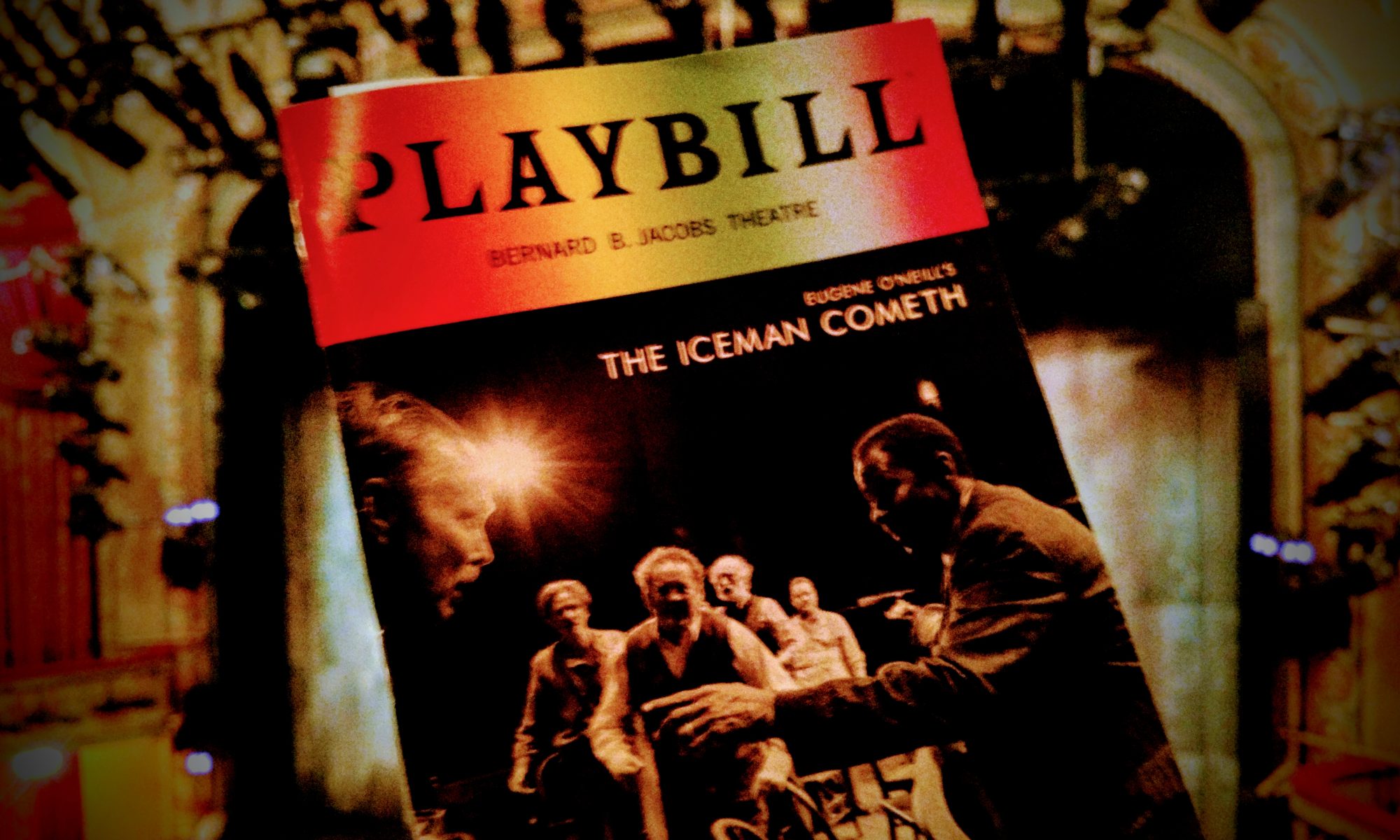Full disclosure: I’ve just come from the closing performance of The Iceman Cometh. Three quick thoughts as I organize my brain –
- A four-hour Eugene O’Neill play is no place for children – and I spotted at least three under the age of eight. I feel for those kids: it can’t have made for a fun afternoon (silver lining, though: solid air conditioning on a near-hundred-degree day).
- Two words: David. Morse. I’m on a bit of an unplanned David Morse binge of late that includes episodes of HOUSE and John Adams as well as Dancer in the Dark: WOW, am I professionally-crushing hard on that man. To be clear: a professional crush is in no way romantic, the feeling is solely one of profound respect and admiration related to mastery of a craft I consider important. (Another I’m nursing currently in the same lane: Jeff Daniels [Looming Tower; Blackbird; Newsroom…].)
- After recent viewings of Harry Potter and the Cursed Child and Angels in America, miraculously, Iceman felt…short? (!!?!?!!?) Whole world’s gone mad…
Which leads to why I beelined for the nearest quiet space with cold coffee and an open outlet to write down some thoughts I’ve been wrestling with lately when it comes to this past Broadway season – my first as a New Yorker – and my first having worked on a Tony-nominated show (!?!).
A refrain I heard and read throughout Tony Season, paraphrased by friend groups both in and outside the theatre industry: it was season of (1) “endurance plays,” (2) “corporate musicals,” …and (3) The Band’s Visit.
By and large, Broadway marketers this season split potential theatre-goers into two camps – let’s call them Candy and Vegetables (both sources of sustenance presumably available to all – yes, even me #gfgummies): Are you and your family emotionally prepared to watch Nathan Lane and Andrew Garfield bleed on a Broadway stage? (Vegetable) – Or, perhaps a refreshing, if less challenging evening of Ethan Slater’s Tony-worthy SpongeBob? (Candy). Do you and your friends crave four acts of Denzel’s Hickey (Vegetable), or an invitation from Disney to sit back and “Let It Go” (Candy)? Would you and your date prefer six stunning acts from J.K. Rowling’s magical mind or some fun beach songs by Jimmy Buffett? (You get the idea.)
An aside – something else I must get out of my system: a friendly reminder that THE HOST OF NICKOLEDEON GUTS WROTE A PIECE OF THEATRE – COMPLETE WITH AERIAL EFFECTS TO ENHANCE A B-PLOT OF FAT-SHAMING TO SET-UP THE SONG “CHEESEBURGER IN PARADISE” – AND IT GOT TO BROADWAY. If that doesn’t inspire up-and-coming librettists to keep their Broadway dreams alive, I’m not sure what will. (It certainly inspires me.)
But back to the Season:
Eating Our Theatre Vegetables: The Power of Endurance Plays
Personally, I find something indescribably special in spending a full-day at the theatre: intermission snacks and water bottles smuggled into an oversized purse, carefully selected comfortable attire for any climate, choice of companion – if any. By the end of the day, the whole audience breathes together. I love that. What I love even more: the feeling that I’ve been immersed into the world of the play so fully I’m thinking about life from a perspective that isn’t my own. For those unable to travel, taking day-long adventures to the theatre can open a willing mind in ways few experiences can. (And it’s not just Broadway: some of my favorite more recent theatre marathons include Goodman’s 2666 and Hypocrites’ All Our Tragic.)
Still: this season, between Iceman (running 3:50), Harry Potter (5:15) and Angels (7:30), producers assigned Broadway lovers – and Tony Voters – a lot of homework. And let’s face it: reemerging into Times Square at the end of a theatre marathon hits like a mental version of the bends. Asking your most valued consumers to do it three times in a season? Oy. Having seen all three of these epics this year (I’m incredibly lucky and I know it), even I must admit: I’m drained.
SUGAR RUSH: The Charm of Corporate Musicals
I am not at all averse to “corporate musicals.” In fact: I worked on SpongeBob SquarePants, saw it three times (including once during its Chicago run), and enjoyed each visit to Bikini Bottom thoroughly – on Opening Night, my face literally hurt from smiling so hard during Gavin Lee’s four-legged tap solo. I can personally attest that Executive Producer Susan Vargo and Viacom, Director Tina Landau, Ethan Slater – all involved on the project – did their f**king homework and did it well. It’s a solid show, and I sincerely wish it could find more of an audience; I believe it deserves one.
From the vantage point of what I like to call “Musical Muggles” (non-theatre-goers), Broadway aficionados run the risk of sounding elitist – and I believe so-called Corporate Musicals expand the number of entry points into the artform. When I saw Escape to Margaritaville, I sat among men on business trips who’d packed special shirts for the occasion – these were not typical theatre-goers, but they were all having a fun night out at the theatre. I will never be mad about that. (Do I wish Rema Webb and Alison Luff had more interesting songs to sing on a Broadway stage? GOD, YES.) I will also never be mad at more musicals full of strong female leads (Frozen; Mean Girls). And I will definitely not be mad about comedy writers branching out in the direction of Broadway: Welcome, Tina Fey – please bring your friends (and have them hire mine)!
My philosophy, generally: I’m an advocate for anything done in the spirit of creating good theatre.
A dark thought I cannot shake (and I know I’m not alone): Hamilton swept the Tony Awards the same year Donald Trump was elected president. The Muslim ban – in all of its ugly iterations – and immigrant family separations happened after Lin-Manuel Miranda’s moving and instantly famous message of love at the 2016 Tony Awards. Members of Congress and the Trump Administration saw Hamilton. Millions saw Lin’s speech – at least one had it tattooed into her skin. We are where we are.
…And where I’m left in the wake of this Broadway season, as with current American politics: those with the power to affect change – producers, politicians – seem to have very different ideas of what America needs right now.
Earlier this week, in the wake of more distressing Supreme Court decisions (Janus v. American Federation; Trump v. Hawaii – I could go on, there are several recent upsetting opinions) and the announcement of Justice Kennedy’s retirement, my mind went to a dark place. A place so dark, I found myself “in the mood” to finally watch Dancer in the Dark.
Unfamiliar with Dancer in the Dark? Perhaps you might have it filed away in your memory as “that movie Björk did.” Or, maybe you’ve heard of it as “the saddest, most soul-crushing movie ever” according to one or more of your friends – which was the case for me, and also why I hadn’t run out to see it sooner: I’ve been, by and large, not in the mood to have my soul crushed – especially by a piece of art that uses musical theatre as its principal metaphor for escapism.
But, thanks to present-day America, my soul is shattering: so…bring on the Björk – and David Morse!
A quick synopsis of Dancer in the Dark
Washington State, 1964. Björk plays Selma, a charming Czech immigrant participating in the most literal production of The Sound of Music in existence – complete with kitten whiskers, copper kettles, and brown paper packages tied up with strings. It’s clear from the outset: this character loves musical theatre more than anything. (I mean, a person would have to have a marrow-deep love of musicals to be into this production: point made, Lars von Trier.)
Soon after, we learn that Selma suffers from a genetic degenerative eye condition and will soon be blind: she came to America with her son to save money for him to have a surgery that will prevent this fate. They live in a trailer on property owned by a policeman (David Morse) and his wife; Selma works in a factory with her friend, Kathy (played by the incomparable Catherine Deneuve), who also accompanies her to movies and “translates” the dance sequences by placing her fingers on Selma’s hand to mimic the movement (:::soul goosebumps:::).
As Selma deteriorates, she finds respite from her suffering through musical-fueled fantasies: about halfway in, the film itself begins to break out into full-scale musical numbers – led by none other than Selma: we are all in on her escapism.
—SPOILERS BELOW—
Suffice it to say: things do not go well for Selma…who ends up on death row for a brutal murder (of David Morse – who creepily and calmly talks her through it) and spends her final night, blind in a prison cell, singing “My Favorite Things” a cappella into an airshaft (:::soul shattered:::). AND THEN: she is hanged, while attached to a wooden backboard – WHILE SINGING in a way that would make *actual* hills come alive with the sound (:::shards of my recently-shattered soul spread through my bloodstream in a grief-gasm of epic proportions approaching Grave of the Fireflies-level:::). I’ve never before wanted so desperately to dive into my television and save a fictional character from the gallows – not even Ned Stark.
—END OF SPOILERS—
I’m still unpacking Dancer in the Dark, and probably will continue to do so for some time.
A question I cannot shake, nor answer: do musicals help or hurt Selma? Lars von Trier presents pros and cons of Selma’s escapism so equally and effectively I can’t be certain…
…Which led to an unexpected side-effect. Björk’s performance caused me to consider the current state of Broadway – the power producers wield, and the range of metaphorical weapons they pulled from their war chests this year: HIV-induced visions of angels and margarita-fueled escapes; liberation from the lure of pipe dreams preached by a traveling salesman and the scientific invention of a karate-trained squirrel; dark magic in times of grief and pretty-girl mind games in times of adolescence.
The range feels so wide, and in search of common ground I come to question: isn’t this all just escapism? Are we, as theatre-makers, actually affecting real change in the minds we think we are? Or, are we just training the Selmas of the world to find ways to see dancing in the darkness?
To be clear: I believe deeply in the power of theatre, and I believe my life provides ample evidence in support of it. Where I become less clear: what is the theatre audiences need right now? I say this as someone in the midst of writing a musical – and cultivating a dream to spend the rest of my life making more.
Perhaps David Yazbek and Itamar Moses (and along with them, Tony Voters) are onto something, at least for the moment: maybe the darkness of escapism is a place best left for short visits only. And as for dancing? Well, we can’t all be so lucky to have Catherine Deneuve finger-dance on our palms: maybe sometimes, to make a powerful point simply and universally, all you need is Katrina Lenk to lift an arm.
Direct private comments to me by email: I’d love to hear from you!
(Totally unrelated: my partner and I are both dying for Björk to record a cover of Michael John La Chiusa’s “Tom.” Just putting that out into the universe…)
More JMSunderduress you may enjoy…

